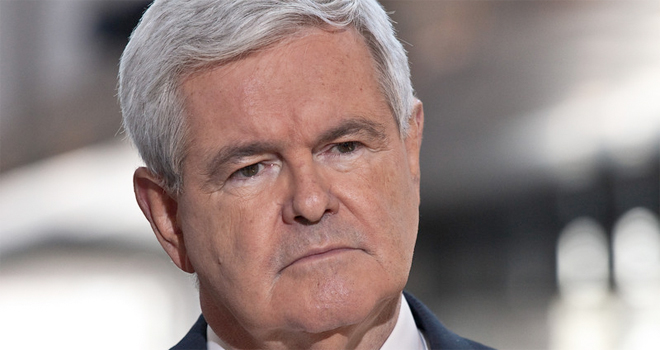For years, Newt Gingrich has been laying the groundwork for a presidential run by raising money, producing films, and building up his profile in the national media. Somewhere along the way, however, he forgot to find supporters.
Newt’s lack of any prominent surrogates has proven disastrous over the past week as he’s tried to save his campaign from one of the most difficult rollouts in recent memory. While Republicans of all stripes pilloried him in the press and Democrats gleefully cheered them on, Gingrich stood alone with few — if any — high-profile names stepping up to defend him.
But it’s no surprise to critics, former colleagues, and even some campaign backers to see Newt going it alone. As even a cursory look at his career reveals, Gingrich has left behind a trail of intense rivalries, simmering grudges, and wafer-thin core support that has left him with few friends to carry out his campaign.
“He burned a lot of bridges,” conservative fundraising guru Richard Viguerie told TPM. “He has that type of personality. … He’s done it in his personal life, in his political career. There’s just certain wires there that don’t connect.”
The chair of Newt’s Iowa campaign, state Rep. Linda Upmeyer, chalked up the lack of support to the early stages of the campaign, saying that national GOP figures were still waiting to see the the full primary field before getting involved. But Katon Dawson, Newt’s South Carolina chair, acknowledged that Gingrich is no stranger to isolation.
“Newt’s a guy who’s been alone in these fights a long time,” he told TPM. “If you look into the 1990s when they were taking on big stuff — welfare reform, when Clinton vetoed him before signing the budget, reducing the deficit — those were big, big things and he didn’t have a lot of partners then.”
While Gingrich is best known as the architect of the Republican’s historic takeover of Congress in 1994 after four decades in the minority, his inability to maintain a loyal base within his party after becoming Speaker proved a constant source of tumult and eventually was his downfall.
It seemed he found a way to alienate every core constituency along the way. Among House conservatives, His failure to win the public debate over a government shutdown and President Clinton’s subsequent re-election were a source of bitter frustration. Among House moderates, his outrageous rhetoric, which included linking a woman who killed her two children to Democratic policies, helped tar moderates like presidential candidate Bob Dole by association. And news of the more sordid aspects of his personal life proved a humiliating stain on the party after unsuccessfully impeaching President Clinton on charges related to his own sexual dalliances.
In 1997, multiple House leaders including then-Reps. Dick Armey, Tom Delay, and Bill Paxon were implicated by the press in a failed coup attempt against Gingrich, forcing Paxon to step down from his post. While their first effort failed, Gingrich’s support cratered the next year after their majority shrunk further and he resigned before his rivals could kick him out themselves.
TPM asked Gingrich on Monday at a breakfast held by the Christian Science Monitor whether his lack of prominent supporters after many years in Washington was a legitimate concern.
“It’s not one I spend a lot of time worrying about,” he said. “I have many, many supporters going back to the mid-80s and earlier who still support me, but they tend to be grassroots and it’s not necessarily Washingtonians. I’m not a Washington figure despite the years I’ve been here, I’m essentially an American whose ties are across the country and whose interest is how you change Washington, not how you make Washington happy.”
At least one close ally during his salad days as Speaker acknowledged at the time that his inability to cultivate loyal supporters was indicative of a broader character trait. Vin Weber, a longtime colleague in the House who became a key advisor, ominously noted in 1996 that he had seen this dynamic not only in his own relationship with Newt, but in Newt’s marriage to then-wife Marianne Gingrich as well. They later divorced after Gingrich had an affair with a staffer, his current wife Callista Gingrich.
“We’re friends and we socialize together,” Weber said then in an interview with PBS’ Frontline. “But it’s hard to form a close personal attachment to somebody who is really consumed by his work. I’m sure that his wife Marianne, who’s also a very good friend of mine, finds that frustrating too because nothing really comes before his work.”
He added: “I think there’s something in his personality make-up that makes it a little harder to attach to people.”
According to Viguerie, it’s no surprise to find that a dozen years out of office haven’t altered this dynamic.
“His base to a large extent is his own organizations, his own think tanks, and the national media,” he said. “The knock on Newt, whether it’s valid or not … is that Newt has always, it seems, been about Newt.”
Rich Galen, a Republican strategist who was a key member of Newt’s staff in the past, penned a column this week slamming Gingrich’s campaign’s numerous “unforced errors” and noting a copious lack of financial help from his supporters in his most urgent time of need. He pointedly flashed back to his own tumultuous relationship with the former Speaker, including several years in the 1980s in which they refused to speak with each other after an argument.
“Everybody thinks they know who Newt is,” Galen told the Washington Post, and a significant portion don’t think they like him, and he’s going to have to convince them.”









